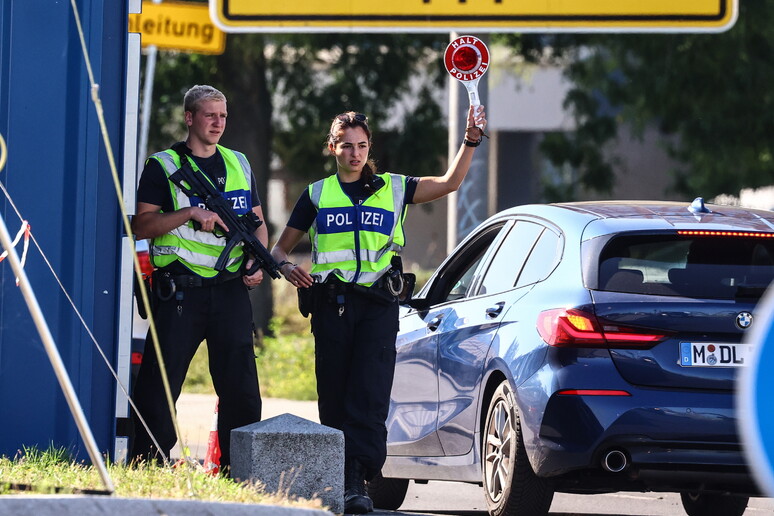With Germany ramping up border
controls earlier this month and other EU countries contemplating
stricter migration rules, the Schengen zone of free movement -
and no internal border checks - seems to be crumbling.
In mid-September, Germany expanded border controls to the
frontiers with all its nine neighbours in hopes of curbing the
flow of irregular migrants, addressing threats from Islamist
terrorist groups and cross-border criminal organisations. The
move has sparked protests from other EU members.
Germany lies at the heart of Europe and of the visa-free
Schengen zone, which is designed to allow the free movement of
people and goods, long a core idea of the European project.
After deadly knife attacks in the German cities of Mannheim and
Solingen causing outrage and horror, long-standing debates over
how to handle migrants seeking asylum in Germany have
intensified in recent weeks.
The suspected attacker in Solingen, a Syrian citizen, had evaded
an order to be deported from Germany to Bulgaria, where he first
entered the EU.
Poland, Austria and Greece have been among countries to complain
about the introduction of border checks, which are set to last
an initial six months.
Polish Prime Minister Donald Tusk condemned the move as
"unacceptable" and his Greek counterpart Kyriakos Mitsotakis
said in an interview with Talk Radio that an "unilateral
abolition of Schengen" was not the answer.
The Czech Interior Minister Vit Rakušan said that he does not
expect any change at the Czech-German border.
Border controls with Poland, the Czech Republic, Austria and
Switzerland were already in place before and have been expanded
to the borders with France, Luxembourg, the Netherlands, Belgium
and Denmark.
With national elections looming in Germany next year, the
attacks in the country put intense political pressure on
Chancellor Olaf Scholz's government to toughen its stance on
migrants and asylum seekers.
But this is not exclusive to Germany: The success of far-right
parties in elections in key European countries is prompting even
centrist and left-wing governments to tighten policies on
migration, creating cracks in European unity and sparking
concern among activists.
Experts: Border checks won't curb illegal migration
The UN High Commissioner for Refugees Filippo Grandi told the
German daily Stuttgarter Zeitung there were "alternatives to
restrictive measures" such as turning migrants back at the
border. "A fixation on border controls will not deter the truly
desperate," Grandi said.
"The reintroduction of temporary internal border controls in the
Schengen area is almost the automatic consequence of the lack of
a common understanding of who is allowed to enter and for what
purpose", Jean-Louis De Brouwer, director for European affairs
at the Egmont Royal Institute for International Relations in
Brussels, told Romanian news agency AGERPRES.
In his opinion, the reintroduction of internal border controls
in Schengen would, in one way or another, "be detrimental to the
internal market". He believes that very soon - it could be at
the next European Council - the member states will have to
answer a very difficult question: whether they want to keep
Schengen or not.
Migration researcher Gerald Knaus does not expect the extension
of border controls to all German land borders to lead to a
noticeable decrease in the number of asylum seekers. "Anyone who
expects border controls to lead to a reduction in irregular
migration is creating an expectation that is unrealisable," he
said on Deutschlandfunk radio.
Border controls were also not a means of preventing Islamist
terrorism, for example, as many of the perpetrators became
radicalised in Germany, the researcher further said.
What is Schengen and who's part of it?
The border-free Schengen area allows free movement for more than
425 million EU citizens and non-EU citizens who legally live,
work, travel or study in the European Union.
Named after a small village in Luxembourg, the Schengen zone
started as an intergovernmental project with five countries in
1985: Luxembourg, Germany, France, Belgium and Netherlands.
In waves, the Schengen zone grew and now incorporates most EU
countries - except Cyprus and Ireland - as well as non-EU states
Iceland, Norway, Switzerland and Lichtenstein. Today, it is the
biggest zone of free movement in the world.
According to the Council of the European Union, 3.5 million
people cross internal borders every day.
Even though Germany's decision has sparked controversy, it's not
the only Schengen member having border checks in place. Austria,
Denmark, France, Italy, Norway, Slovenia, Sweden also have
temporary measures in place.
The Court of Justice of the European Union (CJEU) ruled in 2022
that a Member State can only extend temporary border controls if
it is faced with a new threat affecting its public policy or its
internal security that is different from the threat initially
identified.
(continues)
ALL RIGHTS RESERVED © Copyright ANSA











